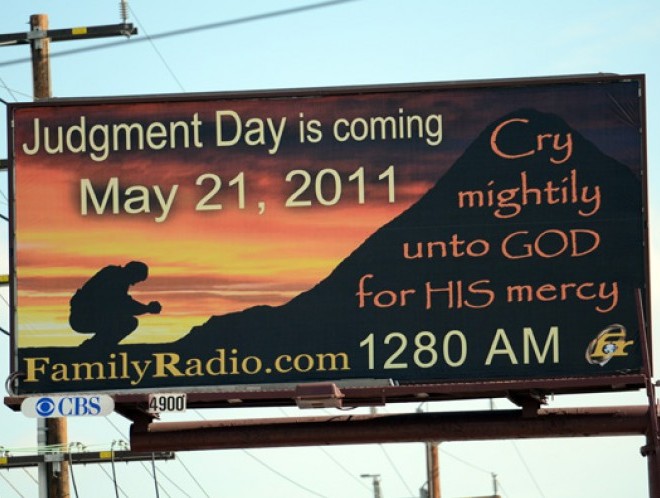 In 2011, evangelical Christian broadcast network Family Radio spent an estimated $1 million on a national billboard campaign. As many as five thousand advertisements were erected across the country, each displaying the same message: “Judgment Day May 21.” In an attempt to convince passing skeptics, the billboards also stated that “The Bible Guarantees It,” and encouraged people to “cry mightily unto God,” a passage from the Book of Jonah in the Old Testament. Helpfully, the billboards in some states also listed the days, times, and frequencies of Family Radio’s broadcasts, presumably in case people wanted to tune in and learn more about their forthcoming judgment on their way home from work or after picking the kids up from soccer practice.
In 2011, evangelical Christian broadcast network Family Radio spent an estimated $1 million on a national billboard campaign. As many as five thousand advertisements were erected across the country, each displaying the same message: “Judgment Day May 21.” In an attempt to convince passing skeptics, the billboards also stated that “The Bible Guarantees It,” and encouraged people to “cry mightily unto God,” a passage from the Book of Jonah in the Old Testament. Helpfully, the billboards in some states also listed the days, times, and frequencies of Family Radio’s broadcasts, presumably in case people wanted to tune in and learn more about their forthcoming judgment on their way home from work or after picking the kids up from soccer practice.
I immigrated to the United States from England around the time that the billboards began to appear. The first time I saw one, I was driving down I-93 from Logan International less than an hour after my flight had landed. Imagine my disappointment to learn that the apocalypse was supposedly scheduled to occur just fifty-one days after my arrival.
Nothing says “Welcome to America” quite like a billboard advertising the end of the world.
The campaign was the brainchild of the late Harold Camping, a former civil engineer who, having decided there was more money to be made in saving souls than building bridges, turned his back on his former career in the late 1950s to become a full-time preacher. Camping spent the subsequent decades attempting to warn the spiritually lost of their impending doom, and predicted the precise date of the Rapture on no fewer than four occasions. However, it wasn’t until Family Radio’s billboard campaign that America’s media apparatus began to take notice of Camping’s ominous prophecies.
When May 21, 2011 came and went without the sudden disappearance of millions of people, Camping backtracked on his original prediction, stating that the date had been a spiritual reckoning rather than a literal one, adding that the true Rapture of the church would actually take place on October 21. Only after his fourth and final prediction was proven inaccurate did Camping publicly admit the “sinful” error of his ways before gradually fading from public view. Over the course of the next two years, his ministry hemorrhaged more than $200 million and most of his formerly loyal flock abandoned him. Camping died in relative obscurity last year at the age of ninety-two.
Before the media finally took an interest in Camping and his alarmist prophecies, both he and his predictions had long been derided by the Christian mainstream. Camping’s lack of formal theological training aside, the Christian establishment frequently took issue with the fact that few of the numerous prerequisites for the end times to begin had been met.
Depending on the apocalyptic theological perspective in question, the most prevalent of which among American evangelicals is dispensationalist premillennialism, a complex timeline of events is prophesied to occur during the end times. For starters, the Third Temple, the architectural design of which was first described in the Book of Ezekiel in the Old Testament, must be rebuilt in Jerusalem. A military coalition between Russia and Iran will form soon after the Temple’s completion. The antichrist, whom most eschatological scholars agree will be European, will then broker a seven-year peace treaty between Israel and the armies of God’s enemies. The governments of the world will coalesce to form the New World Order under the rule of the antichrist, who will then take up residence within Ezekiel’s Temple before declaring himself God. Shortly afterward, the mark of the beast (an insignia borne on either the hand or forehead that will be essential to purchase goods or services, as described in the Book of Revelation) will be enforced by law. At this point, God will send forth an angel offering humanity one final chance to reject the beast and choose Christ. The world’s oceans and rivers will turn to blood, catastrophic earthquakes and other natural disasters will lay waste to cities around the world, and the planet will be enshrouded in perpetual darkness. The Euphrates River will dry up, allowing the “Kings of the East” — the Russian and Iranian military forces — to approach Israel. The antichrist will marshal these armies at the Plains of Megiddo in preparation for the final battle of Armageddon. Only after these events have come to pass will the forces of evil be ultimately defeated by Jesus, ushering in the Millennial Age of Christ’s second reign on Earth, a time of perfect harmony and peace.

Dan Shewan writes a monthly column for Full Stop about underground and alternative American subcultures. Based in Massachusetts, he is currently working on a collection of essays in addition to a longer work of nonfiction.
“When we talk about eschatology, we are talking about books and genres in the biblical canon,” says Dr. Judith Mendelsohn Rood, a professor of history and Middle Eastern studies at Biola University, a private Christian college located in La Mirada, California. Rood was the first woman ever permitted to study at the Islamic Archives in Jerusalem, and the first American to do so since 1967. “There’s a tension between understanding that literature as prophecy and, in a sense, truth — that these things will happen — as opposed to a genre of apocalyptic literature which helps us to process our disappointments and fears in life. Some believers believe that the things the Bible reveals about the future will come true. That’s a given. We anticipate those things will happen, yet we have to live as if they won’t happen.”
With the possible exception of North Korea, America is perhaps the most uniquely insular nation in the world. Of course, the vast majority of North Koreans have little choice in the matter, whereas many Americans purposefully view the world within the narrow context of their own egotistical narrative. Interpreting the complexities of current affairs can be difficult for even diligent newshounds, which makes deciphering the intricacies of Middle Eastern politics even more challenging for your average Christian evangelical. Fortunately, there are dozens of websites that provide this very service free of charge.
Sites such as Prophecy Update, Beast Watch News, and End Times Headlines all report current events through the lens of biblical prophecy. However, few are as comprehensive in their reportage as Now the End Begins, a website that bills itself “the magazine of record for the last days.” Now the End Begins offers a thorough introduction into the world of eschatological paranoia, including a crash course titled “Conspiracy Theory: 101,” a page devoted entirely to the insidious danger of RFID microchips (a technology commonly seen as the mark of the beast), and a section extolling the spiritual virtues of healthy dietary habits.
“I do believe that you can understand history from a biblical perspective,” says Rood. “However, I don’t think the issues that we’re facing today, in our times or in any times past, relate to the specific unfolding of events prophesied in the apocalyptic literature. I don’t think we’re there, and I don’t think we can interpret the prophecy through reading a newspaper — although there are many people in my circles who would disagree with me. I think that’s a dangerous tendency; to think that we can somehow figure out what’s going on by comparing the newspapers and reading prophecy.”
Although escalating tensions in the Middle East tend to take center stage in the reporting of sites like Now the End Begins, the besieged nation of Israel is far from the only topic of concern to their readership. Everything from Russia’s suspected involvement in cybercrimes against American financial conglomerate JP Morgan to Starbucks’ decision to cease operations in Israel in 2003 are fodder for half-baked conspiracy theories about demonic corporate espionage or political compliance with the secretive New World Order. Other topics I discovered that are somehow tied to the coming end of days included the possibility that the Pentagon will permit transgendered individuals to serve in the armed forces, current administrative difficulties regarding illegal immigration, whether or not Ebola is the pestilence spoken of in Luke 21, and even corporate inversion, the practice of American businesses relocating their headquarters overseas to escape the greedy clutches of Uncle Sam and the IRS.
“It can be dangerous when people don’t understand the realities of the conflict and they’re just reading the Bible, and therefore they are interpreting and analyzing Israel’s enemies along biblical lines,” says Rood. “It’s comforting, in some ways, to hear that kind of interpretation — but it’s misleading, and it does lead to political actions. I would like to see people reframe the way they are thinking about things. The Bible can sometimes confuse us.”
The second coming of Christ and the accompanying orgy of destruction it will bring is something that excites many Christians like nothing else. On any given Sunday, you could wander into just about any church in America and hear comfortably familiar sermons about Christ’s love, compassion, and forgiveness, but these lessons in peace and harmony are quickly forgotten when the subject of the end of the world rears its head. The Rapture of the faithful as described in the Book of Thessalonians, the subsequent battle of God’s army against the forces of the antichrist on the Plains of Megiddo, and the seven years of tribulation that will follow the Rapture are the stuff of Hollywood action blockbusters to the Christian right.
However, for all its rich, evocative imagery, the Book of Revelation is not exactly the most accessible blueprint for modern Christian living, even when translated into the comparatively straightforward language of the New International Version. As a result, the Christian mainstream has spent (and made) millions of dollars ensuring that the coming apocalypse occupies a prominent position in the hearts and minds of American evangelicals. This fact is perfectly exemplified by the Left Behind series of novels and their cinematic adaptations. Ostensibly cautionary tales, the Left Behind franchise deftly capitalizes on the Christian right’s fascination with eschatological prophecy, and depicts a world in which the righteous have been raptured, leaving the rest of us here on Earth to endure the unimaginable horrors of the tribulation. More than 70 million copies of the Left Behind novels have been sold since the publication of the first title in the series in 1995, and a reboot of the movie franchise starring Nicholas Cage is scheduled for release this fall.
The Christian entertainment empire learned some valuable lessons about franchising from its depraved Hollywood counterpart since the first Left Behind film was released in 2000. Following the relative success of the movies, a series of Left Behind video games was released, despite the fact that the interactive entertainment industry is routinely hailed by Pat Robertson and other silver-haired televangelists as one of the greatest threats to the moral fabric of America. The first game in the series, 2006’s Left Behind: Eternal Forces, was widely criticized not only for its gratuitous violence, but also for its strongly homophobic, misogynistic and religiously intolerant messaging. Left Behind co-author Jerry Jenkins described the controversy as “ridiculous to the point of lunacy,” and said that criticism of the game “clearly comes from people who have not seen the game and have an obvious agenda.”
As many as 90 million Americans — roughly one-third of the nation’s population — identify as evangelical Christians. Although not all evangelicals view the Bible as a text that should be interpreted literally, many believe that the Bible, specifically the books of Daniel and Revelation, foretells the coming apocalypse in precise detail. The Book of Revelation, in particular, is not seen as an ancient record of the hallucinatory visions of an elderly man driven to the brink of madness by the blistering Grecian heat, but as a chronicle of guaranteed certainties that will soon come to pass. Data from the Pew Research Center indicates that 63 percent of evangelicals (approximately 56 million people) believe that Israel is integral to the second coming of Christ, and that 72 percent (almost 65 million people) believe that God promised the land of Israel — a country smaller than the state of New Hampshire — to the Jews.
“I just don’t think the state of Israel is really all that different from any other state that exists in the world today,” says Rood. “It was founded for humanitarian purposes. I have a very realistic view of how Israel came into being that was certainly influenced by believing people who acted in a way that they thought honored scripture and God. In other words, they wanted to help the Jews to reestablish themselves for reasons of justice and humanitarianism, and also they were hoping they were, in some way, being obedient to God’s word. That was 19th century British and American evangelical thinking, but they didn’t understand fully the consequences and they didn’t really understand their times particularly well, because we live in our times but we don’t see them very clearly until we can look back on them. So is Israel in the End Time? No, not at all. I don’t believe it is, but the regathering of the Jewish people at the end of time and all the conflicts that we’re seeing is part of the historic process that makes up the human story. It’s not in any way opposed to the biblical story, but it’s not the full biblical story.”
The strength of many Christians’ convictions regarding the apocalyptic truth of the Bible has gradually become one of the most singularly powerful forces in American politics. In 2004, evangelicals represented 40 percent of the vote for former President George W. Bush, and almost 80 percent of white evangelical Protestants supported Mitt Romney during his failed presidential run in 2012. However, to truly understand how troubling this considerable political influence really is, one need look no further than San Antonio, Texas, home of Cornerstone Church.
Cornerstone is led by Pastor John Hagee, one of the Christian right’s most outspoken figures and the unofficial public face of Christian Zionism in America. A regular fixture on the pre-tribulation conference circuit, where he frequently sermonizes on topics including the growing threat of a nuclear Iran and Muslims’ desire for world domination, Hagee is also the founder of the nonprofit organization Christians United For Israel. CUFI has sent more than $80 million in donations to Israel since its inaugural “A Night for Israel” fundraising event in 1981.
Hagee’s political views have taught him and his organization several lessons in damage control that could be rivaled by only the most torrid political sex scandal. CUFI’s carefully controlled PR efforts insist the organization exists solely to promote unity between the United States and Israel. However, the organization has been the subject of fierce criticism, and Hagee’s personal politics have been described as “extremist” by various Jewish advocacy groups and spiritual leaders. Speaking at a CUFI event in 2006, Hagee said that the United States “must join Israel in a pre-emptive military strike against Iran to fulfill God’s plan for both Israel and the West . . . a biblically prophesied end-time confrontation with Iran, which will lead to the Rapture, tribulation, and second coming of Christ.”In 2008, 5W Public Relations, the Manhattan-based PR firm that represents Hagee, issued a statement denying claims that Hagee had described the Catholic church as “the great whore.” Shortly afterward, Republican Senator for Arizona John McCain publicly distanced himself from Hagee and rejected his presidential endorsement following separate remarks by Hagee that the Holocaust was part of God’s plan to drive the Jews from Europe to their spiritual homeland of Israel.
In light of the criticism leveled against Hagee and his organization, press access to the Night to Honor Israel events has become increasingly restricted. On the exquisitely rare occasions when the event organizers deign to address claims that Hagee’s political position is driven by eschatological prophecy, such connections are swiftly dismissed. Hagee claims to love the Jewish people and the nation of Israel, but Christian apocalypticism forms the basis of much of CUFI and Cornerstone Church’s political and spiritual position; an ideology that includes the notion that only Christians and repentant Messianic Jews will be saved, and that those who refuse to relinquish their spiritual identity as Jews and convert to Christianity will be condemned to an eternity of suffering. In 2008, American journalist Bruce Wilson revealed Hagee’s true agenda by highlighting an example of the apocalyptic messaging of Cornerstone Church’s magazine, an issue of which contained a fundraising advertisement for the “Exodus II” project. The ad invited readers to “become a part of the fulfilment of prophecy” by donating money to Jewish resettlement projects in Israel. It is obvious that eschatology does indeed play a prominent role in Hagee’s teaching and political activism., despite his claims to the contrary.
“I think [some Zionist evangelicals] are actually quite harmful because they get involved in political matters in Israel, like supporting the settler movement,” says Rood. “That should be an internal Israeli conversation, but a lot of American evangelicals’ support for Israel has been translated into giving money to [Israeli] settlers. I think that’s an Israeli-Palestinian conversation that Americans don’t really understand and shouldn’t be involved in.”
Hagee’s frequently Islamophobic messaging is also of great concern to many Christians, including Rood. Innocent Muslims have been demonized and persecuted since 9/11, but the recent uprising of ISIS have not only rekindled the flames of Islamophobia in the United States, but also lent further momentum to and support for the anti-Islamic rhetoric espoused by preachers like Hagee.
“A lot of evangelicals who support Israel have a very extreme view of Islam in general,” says Rood. “Now, I’m not an apologist for Islam, I’m not a Muslim, that’s not my purpose. But I don’t think that causing people to hate is ever wise. I have seen people — not just evangelicals, but Americans and Europeans — who really have identified Muslims as the enemy. Now, there are Muslim enemies, but not all Muslims are enemies. I don’t like to see the Bible used to create political categories that would label people in terms of good versus evil. I think we’re all capable of great good and great evil. Political ideology is what moves people to do evil.”
Despite the barely concealed venom of Hagee’s ideology, he and his organization remain a major force in American evangelical politics, and CUFI’s Night to Honor Israel events have attracted numerous prominent figures from Capitol Hill and beyond. In 2006, former Republican National Committee Chairman and George W. Bush campaign manager Ken Mehlman delivered the keynote address at CUFI’s Night to Honor Israel. Other speakers that year included former Kansas Senator Sam Brownback, and former Pennsylvania Senator Rick Santorum.
However, support for Hagee’s political juggernaut is not limited to the Republican Party, and CUFI can count fans on both sides of the aisle. Former Democratic Senator Joe Lieberman of Connecticut and Congressman Eliot Engel of New York both spoke at the Night to Honor Israel in 2008, both of whom vocally supported stronger American military support of Israel. Other notable guests from the political establishment who have spoken at CUFI events include former Arkansas Governor Mike Huckabee, Republican Senator for South Carolina Lindsey Graham, Republican Senator for Texas Ted Cruz, and Minnesota’s moronic Tea Party darling Michele Bachmann. Last year, right-wing media personality Glenn Beck was invited to speak at CUFI’s Night to Honor Israel, during which Beck said that God was “planning a surprise party for Satan,” to the ecstatic delight of the crowd.
If one can somehow manage to see beyond the elitism and self-righteousness of Christian evangelicals, it is not impossible to see why so many Americans cling desperately to apocalyptic prophecies. Christian eschatology provides millions of people with a comfortable narrative through which to view the almost inconceivable cruelty and violence we see every day. To believe that the end of the world was preordained thousands of years ago must be of considerable comfort to a country struggling to understand its place in a rapidly changing world; a nation of believers that can calmly observe the carnage and destruction on the West Bank from many thousands of miles away, smugly assured of its place in the forthcoming judgment of mankind. What kind of church-going, God-fearing Christian wouldn’t want to believe that the countless lives that have been lost in the name of faith across the Middle East are somehow part of a master plan orchestrated by an omniscient and omnipotent creator?
Author portrait by Eliza Koch. See more of Eliza’s work here.
This post may contain affiliate links.







